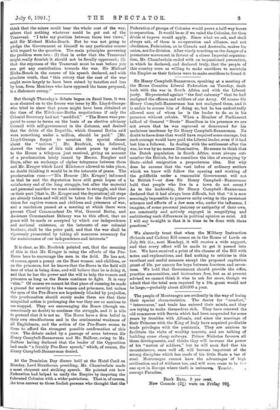But though Thursday's debate began on fiscal lines, it was
soon shunted on to the fiercer war issue by Mr. Lloyd-George, who tried to show that peace might have been obtained at the time of the Kitchener-Botha negotiations if only the Colonial Secretary had not "meddled." "The Boers were pre- pared to come to terms on the basis of an elective advisory Council with self-government in the distance, and desired that the debts of the Republic, which General Botha said were something under a million, should be paid." [Mr. Lloyd-George forgot to mention the special clause about the " natives."] Mr. Brodrick, who followed, showed the value of this talk about peace by reading to the House a telegram just received, giving an account of a proclamation lately issued by Messrs. Burgher and Steyn, after an exchange of cipher telegrams between them and Mr. Kruger which Lord Kitchener allowed to take place, no doubt thinking it would be in the interests of peace. The proclamation runs :—" His Honour [Mr. Kruger] informed us that he and the deputation have still great hopes of a satisfactory end of the long struggle, but after the material and personal sacrifice we must continue to struggle, and that on their part [that is, Mr. Kruger and the deputation] all steps are already taken and will still be taken for the further pro- vision for captive women and children and prisoners of war, and a resolution passed at a meeting at which there were present Chief Commandant De Wet, General Botha, and Assistant Commandant Delarey was to this effect, that no peace will be made or accepted by which our independence and national existence, or the interests of our colonial brothers, shall be the price paid, and that the war shall be vigorously prosecuted by taking all measures necessary for the maintenance of our independence and interests."


















































 Previous page
Previous page